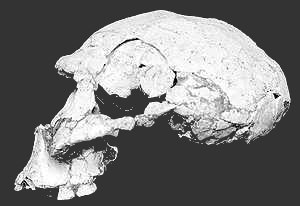|
Descent of Man In this lecture, beginners can familiarize themselves with basic information and terms used to describe the evolution of humanity beginning with the origin of primates through the comings and goings of Genus Homo. |

Fossils may be 'first Europeans'
Posted: Monday, December 23, 2002
Reproduced from BBC, Thursday, 11 May, 2000
http://news.bbc.co.uk/1/hi/sci/tech/745080.stm
 The Remains of what may be the earliest human ancestors to migrate from Africa into Europe have been found in the Republic of Georgia.
The Remains of what may be the earliest human ancestors to migrate from Africa into Europe have been found in the Republic of Georgia.Two skulls, which are probably about 1.7 million years old, were unearthed during an archaeological dig at a medieval castle at Dmanisi.
They were discovered alongside stone tools and the bones of animals. One of the skulls is nearly complete; of the other, only the skullcap has survived.
The fossils suggest that early humans moved out of Africa hundreds of thousands of years earlier than previously thought. They also put a question mark against the assumption that sophisticated stone tool technology was required for migration.
Skeletal characteristics
"This is the first proof for the presence of humans outside Africa at this time," David Lordkipanidze, at the Republic of Georgia State Museum in Tbilisi, told the BBC. "This is most significant."
The age and skeletal characteristics of the Dmanisi skulls link them to the early humans who lived in East Africa at the same time known as Homo ergaster.
This creature was a less developed hominid than Homo erectus that many thought was the first to move out of Africa to populate Asia and Europe.
H. erectus had more sophisticated technology than H. ergaster. He carried a form of advanced tool kit known as the "Acheulean," or "hand-axe" tradition.
But the stone tools found with the Dmanisi fossils are of the less sophisticated "Oldowan" or "pebble-chopper" type that preceded Acheulean technology. More than 1,000 such artefacts were recovered.
The Georgian, German, French and American scientists involved in the latest discovery believe this tool evidence overturns the idea that a more sophisticated technology was required to survive the rigours of migration.
They believe anthropologists will have to look for other explanations for the move.
"It could have been for biological reasons," David Lordkipanidze said. "Humans became carnivores and they wanted to expand their range."
Co-researcher Susan Antón of the University of Florida adds: "Basically, the argument that we're making is that during that time in Africa, the savanna is expanding and there is a greater availability of 'protein on the hoof'.
"With the appearance of Homo, we see bigger bodies that require more energy to run, and therefore need these higher quality sources of protein as fuel."
The Dmanisi discoveries are reported in the journal Science.
Human lines
Commenting on the paper, Dr Chris Stringer, of the Natural History Museum in London, an expert on the "Out of Africa" theory of modern human origins, said is doubtful the Dmanisi hominids were our direct ancestors.
"The line that these people gave rise to may have died out as recently as 50,000 years ago in the Far East," he told the BBC. "So it was a long-lived and successful line, but in my view a dead-end.
"We're descended from similar people who stayed in Africa. Africa in a sense kept pumping out migrations and dispersals of people and this included people like the Neanderthals who, equally, it doesn't seem were our ancestors.
"The ancestors of modern humans may have left Africa only in the last 100,000 years."



